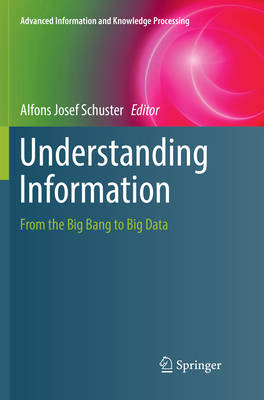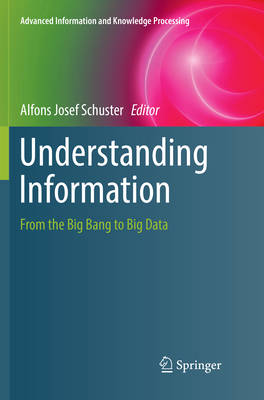
- Afhalen na 1 uur in een winkel met voorraad
- Gratis thuislevering in België vanaf € 30
- Ruim aanbod met 7 miljoen producten
- Afhalen na 1 uur in een winkel met voorraad
- Gratis thuislevering in België vanaf € 30
- Ruim aanbod met 7 miljoen producten
Understanding Information
From the Big Bang to Big Data
Omschrijving
The motivation of this edited book is to generate an understanding about information, related concepts and the roles they play in the modern, technology permeated world. In order to achieve our goal, we observe how information is understood in domains, such as cosmology, physics, biology, neuroscience, computer science, artificial intelligence, the Internet, big data, information society, or philosophy. Together, these observations form an integrated view so that readers can better understand this exciting building-block of modern-day society.
On the surface, information is a relatively straightforward and intuitive concept. Underneath, however, information is a relatively versatile and mysterious entity. For instance, the way a physicist looks at information is not necessarily the same way as that of a biologist, a neuroscientist, a computer scientist, or a philosopher. Actually, when it comes to information, it is common that each field has its domain specific views, motivations, interpretations, definitions, methods, technologies, and challenges.With contributions by authors from a wide range of backgrounds, Understanding Information: From the Big Bang to Big Data will appeal to readers interested in the impact of 'information' on modern-day life from a variety of perspectives.
Specificaties
Betrokkenen
- Uitgeverij:
Inhoud
- Aantal bladzijden:
- 237
- Taal:
- Engels
- Reeks:
Eigenschappen
- Productcode (EAN):
- 9783319865454
- Verschijningsdatum:
- 4/08/2018
- Uitvoering:
- Paperback
- Formaat:
- Trade paperback (VS)
- Afmetingen:
- 155 mm x 235 mm
- Gewicht:
- 453 g

Alleen bij Standaard Boekhandel
Beoordelingen
We publiceren alleen reviews die voldoen aan de voorwaarden voor reviews. Bekijk onze voorwaarden voor reviews.










